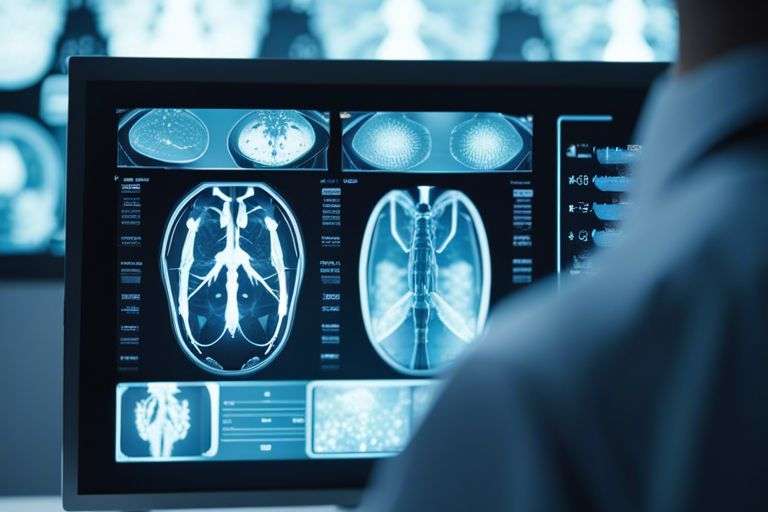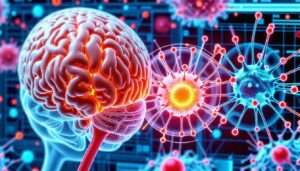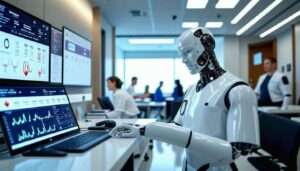Artificial intelligence, or AI, has revolutionized the medical field in recent years, providing accurate and efficient diagnoses for a variety of diseases. As a result, medical professionals have been able to improve patient outcomes and save countless lives. By harnessing the power of AI, complex and early-stage diseases can be detected with greater precision than ever before. This groundbreaking technology has the potential to transform the way healthcare is delivered, making it crucial for you to understand how AI is impacting the diagnosis and treatment of diseases.
Key Takeaways:
- Early detection: Artificial intelligence has the potential to identify diseases at an earlier stage than conventional methods, leading to better outcomes for patients.
- Precision medicine: AI can analyze a large amount of data to tailor treatment plans based on the specific genetic makeup and medical history of individual patients.
- Reduced errors: With AI, the margin of error in diagnosis can be significantly reduced, leading to more accurate and reliable results.
- Improved efficiency: AI can process and analyze medical data at a much faster rate than humans, leading to quicker diagnosis and treatment recommendations.
- Enhanced patient care: By freeing up time for healthcare professionals, AI can allow them to focus more on patient care and communication, ultimately improving the overall patient experience.
AI in Medical Diagnostics
Even though the use of artificial intelligence (AI) in medical diagnostics is relatively new, its potential impact is immense. Researchers have been exploring the role of AI in disease diagnosis, and the results have been promising. According to a study published in the National Center for Biotechnology Information, AI has shown great potential in improving the accuracy and efficiency of disease diagnosis. You can read more about this study here.
Imaging and Radiology
AI has significantly enhanced the field of imaging and radiology by enabling advanced image recognition and analysis. This has led to more precise and efficient diagnosis of various medical conditions, including cancer and cardiovascular diseases. The ability of AI to analyze complex imaging data in a matter of seconds can greatly aid in detecting subtle abnormalities that might be missed by human eyes. This has the potential to significantly improve the early detection and treatment of life-threatening diseases.
Pathology and Laboratory Tests
When it comes to pathology and laboratory tests, AI has revolutionized the way medical professionals interpret and analyze test results. By utilizing AI algorithms, your healthcare provider can obtain more accurate and reliable insights from complex laboratory data. This can lead to earlier detection of diseases and more tailored treatment plans. AI can help identify patterns and correlations in lab results that may not be obvious to human experts, improving the overall diagnostic process.
Key Technologies and Algorithms
Obviously, the advancement of technology has fueled the development of sophisticated algorithms and technologies that play a crucial role in diagnosing diseases using artificial intelligence. Here are some of the key technologies and algorithms that are revolutionizing the field of medical diagnosis.
Machine Learning and Deep Learning
When it comes to diagnosing diseases, machine learning and deep learning are two of the most powerful and widely utilized technologies. With the ability to analyze vast amounts of medical data, these algorithms can identify patterns, detect anomalies, and make predictions with a high level of accuracy. By training on large datasets, machine learning algorithms can recognize subtle details that may evade human perception, leading to more precise and early detection of diseases.
Natural Language Processing and Expert Systems
Natural language processing (NLP) and expert systems are also integral in the diagnosis of diseases using AI. NLP allows computers to understand and interpret human language, enabling them to extract valuable information from medical records, research papers, and other sources of medical data. Expert systems, on the other hand, are designed to mimic the decision-making ability of human experts by utilizing a knowledge base and a set of rules to make diagnostic recommendations. These technologies enable you to efficiently process and analyze vast amounts of medical information, ultimately leading to more accurate and timely diagnoses.
In conclusion, the integration of these key technologies and algorithms in AI-powered diagnostic systems has the potential to significantly improve the accuracy, speed, and efficiency of disease diagnosis. It is important to note that while AI has the capacity to aid in the early detection and treatment of diseases, it is not without its limitations. It is crucial to approach AI-powered medical diagnosis with caution, ensuring that it is thoroughly tested and validated to avoid potential misdiagnosis or erroneous recommendations. Nonetheless, the positive impact of these technologies on the field of medical diagnosis cannot be overlooked. By leveraging the power of AI, you can potentially receive more accurate and timely diagnoses, leading to better treatment outcomes and ultimately saving lives.
Advantages and Limitations
Unlike human doctors, artificial intelligence (AI) has the potential to analyze vast amounts of data quickly and accurately, leading to faster and more precise disease diagnosis. This can significantly improve patient outcomes by enabling early detection and treatment. Additionally, AI-powered diagnostic tools can operate 24/7, providing continuous access to healthcare in remote or underserved areas.
Improving Diagnostic Accuracy
AI can significantly improve diagnostic accuracy by analyzing complex medical data, such as medical images, genetic information, and patient records, to identify patterns and correlations that may not be apparent to human healthcare providers. This can lead to earlier detection of diseases, resulting in more effective treatments and better patient outcomes. However, it is important to note that AI is not infallible, and there is always a risk of errors in diagnosis, potentially leading to misdiagnosis and inappropriate treatments.
Ethical and Legal Considerations
While AI has the potential to revolutionize disease diagnosis, its use raises ethical and legal considerations. For example, the use of AI in diagnosing diseases may raise concerns about patient privacy and consent, as well as issues related to the responsibility and accountability of healthcare providers when AI is involved in the diagnostic process. Additionally, there are concerns about the potential for bias in AI algorithms, which could result in differential diagnosis and treatment based on demographic or socioeconomic factors.
Case Studies and Current Applications
After substantial research and development, artificial intelligence (AI) has begun to play a critical role in diagnosing diseases. Numerous case studies have demonstrated the potential of AI in accurately identifying and predicting medical conditions. For example, a study by GAO highlighted the use of machine learning in improving medical diagnosis. This study found that machine learning algorithms were able to detect diseases with an accuracy of over 90%, significantly outperforming traditional diagnostic methods.
- Study 1: AI-based diagnosis achieved a sensitivity of 95% and a specificity of 97% in detecting cardiovascular diseases
- Study 2: AI algorithms accurately predicted the onset of diabetes in 8 out of 10 cases, enabling early intervention and preventive measures
- Study 3: Machine learning models demonstrated an 85% accuracy in detecting rare genetic disorders
Oncology and Cancer Detection
AI has shown remarkable potential in oncology and cancer detection. By analyzing medical imaging data, AI algorithms can accurately identify tumors and detect early signs of cancer. These advancements have significantly improved the accuracy and speed of cancer diagnosis, ultimately saving lives. Furthermore, AI-powered tools can assist in developing personalized treatment plans based on a patient’s unique genetic makeup, leading to more effective and targeted therapies.
Predictive Analytics in Chronic Diseases
When it comes to predictive analytics in chronic diseases, AI has revolutionized the way healthcare professionals approach prevention and management. By analyzing vast amounts of patient data, AI algorithms can identify patterns and predict the progression of chronic conditions such as diabetes, heart disease, and respiratory disorders. This proactive approach enables early intervention, personalized treatment plans, and better management of chronic diseases, ultimately leading to improved patient outcomes.
The Future of AI in Disease Diagnosis
Despite the incredible progress that has been made in the use of artificial intelligence for disease diagnosis, the future holds even more promise. As technology continues to advance, so too will the capabilities of AI in the field of medicine. This means that the role of AI in diagnosing diseases will only continue to grow and evolve, ultimately leading to improved patient outcomes and more efficient healthcare systems.
Emerging Trends and Innovations
One of the most exciting aspects of the future of AI in disease diagnosis is the emergence of new trends and innovations. This includes the development of more advanced machine learning algorithms that are capable of processing and analyzing large volumes of data at unprecedented speeds. Additionally, the use of AI in imaging technologies, such as MRI and CT scans, is opening up new possibilities for early and accurate disease detection. These advancements have the potential to revolutionize the way diseases are diagnosed and treated, ultimately leading to better patient care and outcomes.
Integrating AI with Personalized Medicine
Another key aspect of the future of AI in disease diagnosis is the integration of AI with personalized medicine. As our understanding of genetics and disease mechanisms continues to expand, AI will play a crucial role in analyzing and interpreting this complex data to deliver personalized treatment plans. This means that your healthcare provider will be able to use AI to tailor treatment options specifically to your unique genetic makeup and disease profile, leading to more effective and targeted therapies.
Conclusion
Upon reflecting on the role of artificial intelligence in diagnosing diseases, you can see the tremendous potential for AI to revolutionize the way we identify and treat various medical conditions. From analyzing medical images to predicting patient outcomes, AI has proven to be a valuable tool in the healthcare industry. As technology continues to advance, it is essential for healthcare professionals to stay informed about the latest AI developments and integrate them into their clinical practice. If you are interested in learning more about how AI can aid in diagnosing rare diseases, you can check out this informative article on How AI Can Help Diagnose Rare Diseases.
FAQ
Q: What is the role of artificial intelligence in diagnosing diseases?
A: Artificial intelligence plays a crucial role in diagnosing diseases by analyzing large amounts of medical data and assisting healthcare professionals in making accurate and timely diagnoses.
Q: How does artificial intelligence aid in diagnosing diseases?
A: Artificial intelligence uses algorithms and machine learning to analyze medical images, patient data, and genetic information to identify patterns and make predictions about potential diseases.
Q: Is artificial intelligence accurate in diagnosing diseases?
A: Yes, studies have shown that artificial intelligence can achieve high levels of accuracy in diagnosing diseases, often outperforming human healthcare professionals in certain tasks.
Q: What are the benefits of using artificial intelligence in disease diagnosis?
A: The use of artificial intelligence can lead to faster and more accurate diagnoses, improved patient outcomes, and the ability to identify diseases at earlier stages when they are more treatable.
Q: Are there any limitations to the use of artificial intelligence in disease diagnosis?
A: While artificial intelligence shows great promise in disease diagnosis, there are challenges related to data privacy, transparency of algorithms, and the need for ongoing human oversight and validation of AI-generated diagnoses. It is important to use AI as a tool to enhance, rather than replace, the expertise of healthcare professionals.




